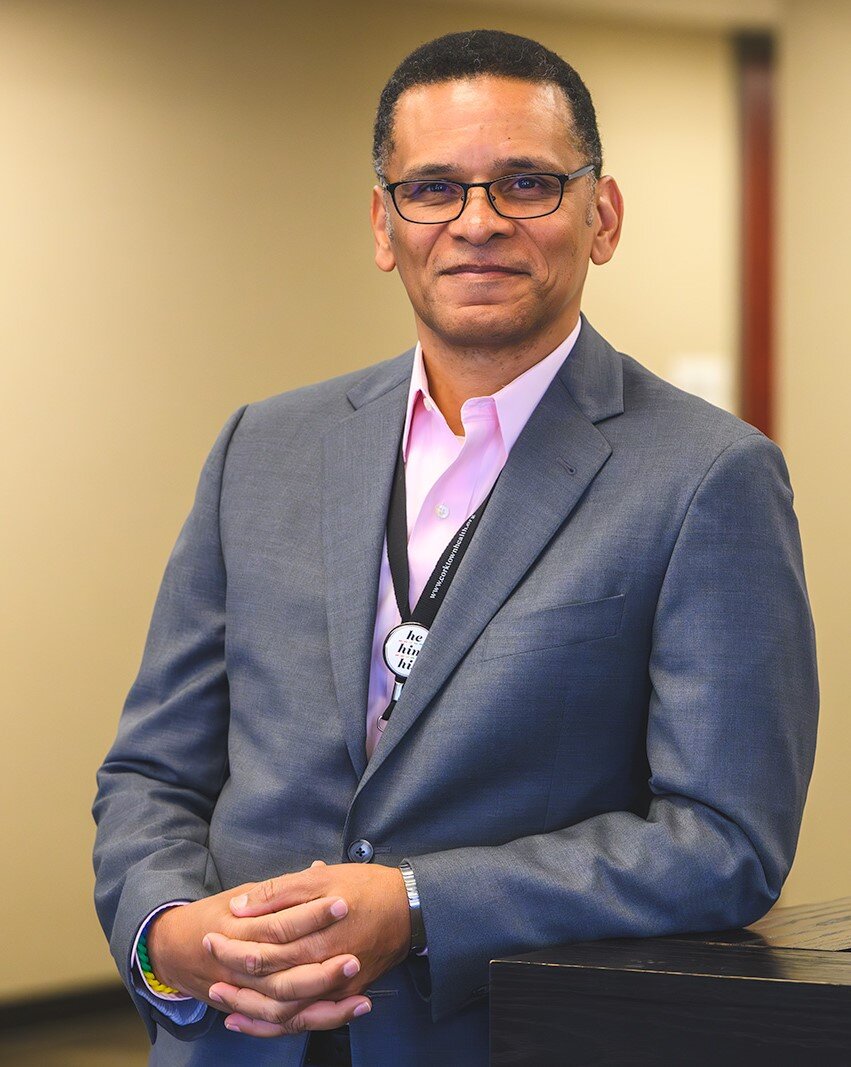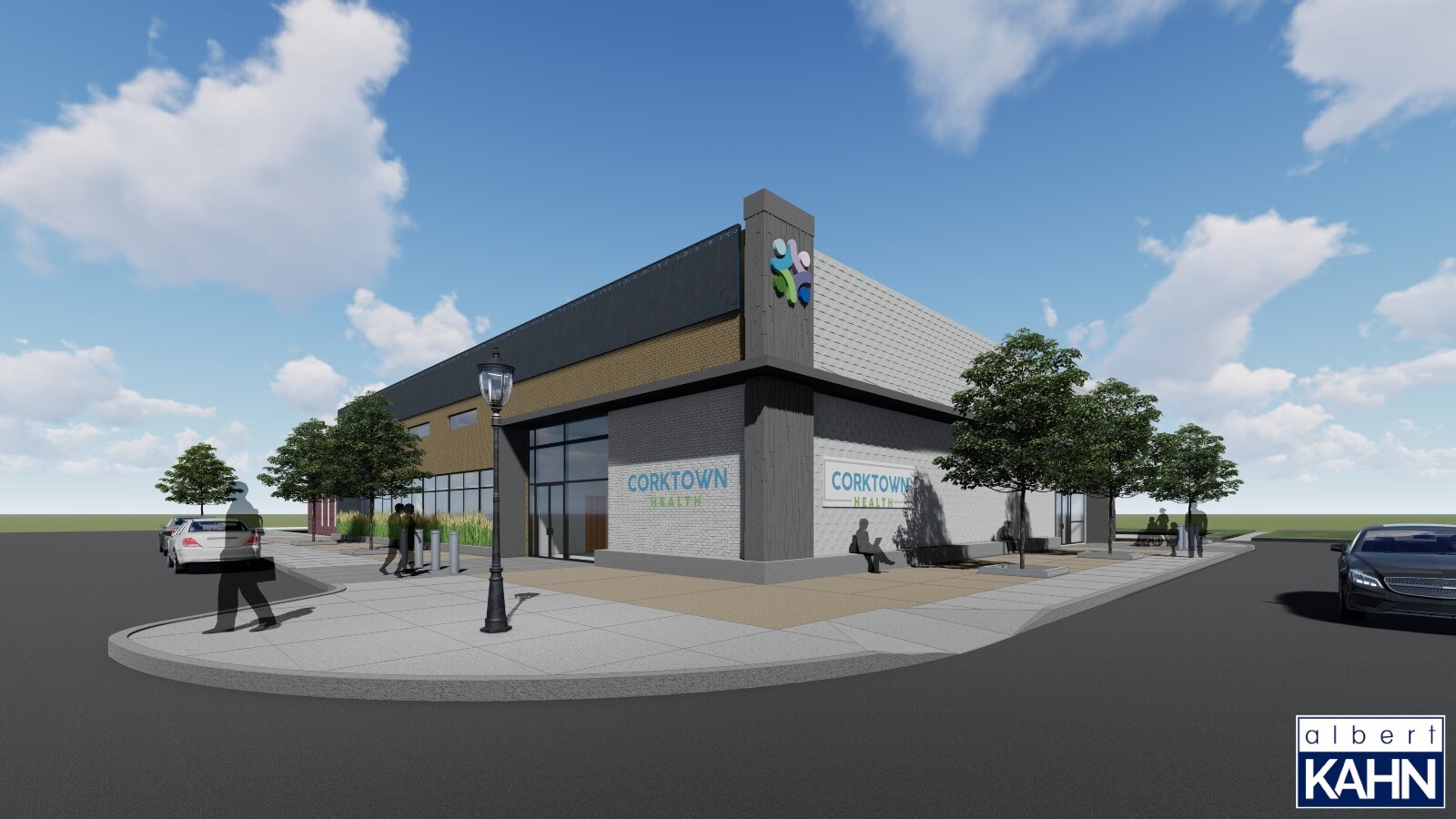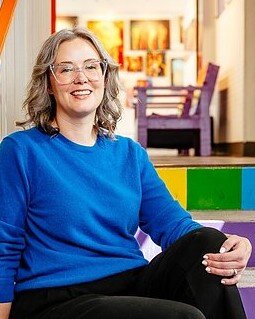By Sarah Schoen | April 23, 2024
This article is part of the Block by Block series, supported by FHLBank Indianapolis, IFF, and the Community Economic Development Association (CEDAM). The Block by Block series follows small-scale minority-driven development and affordable housing issues in the state of Michigan.
 Otis Baker, Corktown Health client services specialist
Otis Baker, Corktown Health client services specialist
Health care is always evolving. As patients’ needs shift, so, too, does the way health care providers serve their communities. In Detroit, Corktown Health is known for being open-minded, adapting to change, and remaining steadfast in a mission to improve the health and wellbeing for all — with a specific focus on the LGBTQ community. Over the years, its health network has grown to include more health centers, increased community outreach, and life-changing impact on the people they see regularly.
Corktown Health CEO Anthony Williams works daily to implement the strategies and objectives of the organization and to address health disparities. He’s been in his current role for a little less than 10 years, but has been with the organization as a board member for over 20.  Anthony Williams
Anthony Williams
“The thing I enjoy most, other than working with our patients and clients, is working with our staff, supporting them in the work they do,” Williams says. “They are amazingly dedicated individuals, committed to the mission of the organization and the community we serve. I see them working every single day to improve the lives of people who walk through our doors.”
Founded to be inclusive, affirming, and accountable, Corktown Health started out in the ‘80s as the Health Emergency Lifeline Programs (HELP), an AIDS service organization in Detroit. HELP provided end-of-life support services for those living with AIDS, offering support and financial assistance. In 2012, Corktown Health was launched as a way to better support folks with primary care, not just end-of-life resources.
“The biggest change for us was when we began looking at how the organization was needing to evolve because the people living with HIV had their lives changed dramatically,” Williams says. “The medication that had been introduced allowed people to live much longer. Truthfully, it was a time in which living with HIV was much more like a chronic disease, and they were living long lives just like anyone else.”
Through research and community meetings, the organization shifted its focus to meet the evolving needs of its patients.
“We discovered there was a real absence of LGBTQ primary care in the community, and we made the decision back then that that’s where we needed to focus,” Williams says.
Although there were similar organizations in San Francisco, Milwaukee, or Chicago, no local Michigan centers focused on LGBTQ health. Corktown Health aimed to close that gap by providing medical care, transgender health services, STI treatment and testing, housing and food assistance, health insurance navigation, and more.
Williams says these needs are vital for the LGBTQ community who deal with stigmas, financial challenges, and discrimination.
“Accessing care isn’t simply about walking into a facility,” he says. “Sometimes, it’s about navigating all of those challenges to make sure you receive the care that you need. All those are the things we try to address here every single day to make sure this is a welcoming and affirming environment for every single person.”
Corktown staff, L to R, Charlene Singleton medical assistant, Mark Thompson PA, Debra Walker registered medical assistant, Guillermo Ethier NP, and Danielle Gibczynski RD.
The funding that enabled growth
The LGBTQ community often faces disparities that can lead to high levels of anxiety and depression. This can lead to suicidal thoughts or attempts, which can make folks avoid medical care because they fear discriminatory conditions and settings.
Williams says IFF, a community development financial institution (CDFI), has been integral in helping Corktown Health grow over the years from a mere conversation to physically opening a clinic in 2017. The $1.425 million loan from IFF allowed Corktown Health to purchase their facility. This enabled the community to receive primary care, behavioral health services, HIV care and treatment, cancer screening, and health-related services all in one place.  Adam Loiselle
Adam Loiselle
Adam Loiselle, senior owner’s representative at IFF, supports clients through the development of facilities, and is typically involved in the pre-development phases of projects. Loiselle says IFF aims to further support and strengthen other nonprofits in the communities they serve.
“We realize that other nonprofits need somebody to champion them,” he says. “We help shape more equitable and vibrant communities by supporting these non-profits through lending, development, and real estate consulting.”
Corktown Health and IFF also worked together in the Detroit cohort of IFF’s Stronger Nonprofits Initiative.
“The Stronger Nonprofits Initiative really helps the leaders of nonprofits led by people of color to navigate through systemic barriers to accessing capital and real estate opportunities,” Loiselle says. “This was a great fit because we provided them a loan to buy their facility, and then we helped to mentor them through a 14-month-long curriculum that includes training sessions, peer learning, one-on-one financial coaching, and a customized real estate consulting plan to help them continue to grow.”
 Rendering of Corktown Health Hazel Park clinic
Rendering of Corktown Health Hazel Park clinic
Their latest venture together is a new Corktown Health facility in Hazel Park, estimated to open later this year or early 2025. The goal is to expand access to care even more, reach folks outside of downtown Detroit, and becone a one-stop-shop offering dental services, testing, treatment, supportive services, nutrition, and behavioral health services.
Williams hopes to set an example of a supportive, affirmative, caring atmosphere via Corktown Health that can serve as a model for other health care providers, too. Later this summer, Corktown Health will launch educational opportunities for providers to help improve their outcomes with the LGBTQ community and its unique needs.
Corktown Dental Clinic, L to R, Geraldine Williams registered dental hygienist and Ayana Mosley lead dental assistant.
Partnerships expand the reach
Corktown also partners with many community-based organizations, including the Affirmations LGBTQ+ Community Center in Ferndale, Wayne Health, the City of Detroit Health Department, and MiGen. During the major summer Pride events, Corktown has booths with testing, information, and more.
Angela Gabridge is the executive director of MiGen, the only non-profit in the state exclusively dedicated to older LGBTQ adults and those who care for them. MiGen’s focus is on both training and educating care providers and providing direct services and social programming.
The goal is to create welcome and affirming environments for all clients, which can include making sure providers are educated on intake forms, preferred language and pronouns, terminology, and the modern science of gender identity.
 Angela Gabridge
Angela Gabridge
“For the last two and half years, MiGen has been in a really transformational growth cycle,” Gabridge says. “We’ve gone from offering one or two programs to now offering a couple dozen programs. A lot of that work has been done in partnership with Affirmations and Corktown Health.”
Gabridge says, despite progress, there still remains a lot of stigma surrounding the LGBTQ population, especially older adults.
“This is something that the LGBTQ community has been asking for for a long time, to have a designated space and to have services at scale for older adults,” she says. “It’s just been something that has been a perpetual challenge because of capacity and resource issues. There’s a lot of funding and focus that goes into the younger side, but it’s been a much tougher sell to get investment on the senior side of things.”
Gabridge hopes the community will embrace the new Ferndale Affirmations and Corktown Health locations and feel comfortable engaging with MiGen and Corktown Health in the future.
“We have folks accessing and participating in services for the first time that maybe never had before, or they weren’t aware of what was available, or they were a little nervous about coming,” she says. “It’s really been making an immediate difference and we’re hoping to see the same thing when we open the Corktown space.”
Read the original article on Second Wave Michigan!
Sarah Spohn is a Lansing native, but every day finds a new, interesting person, place, or thing in towns all over Michigan, leaving her truly smitten with the mitten. She received her degrees in journalism and professional communications and provides coverage for various publications locally, regionally, and nationally — writing stories on small businesses, arts and culture, dining, community, and anything Michigan-made. You can find her in a record shop, a local concert, or eating one too many desserts at a bakery. If by chance, she’s not at any of those places, you can contact her at sarahspohn.news@gmail.com.
Photos by Doug Coombe
Photo of Adam Loiselle courtesy IFF.
Photo of Angela Gabridge by Nick Hagen.
This article is part of the Block by Block series, supported by FHLBank Indianapolis, IFF, and the Community Economic Development Association (CEDAM). The Block by Block series follows small-scale minority-driven development and affordable housing issues in the state of Michigan.